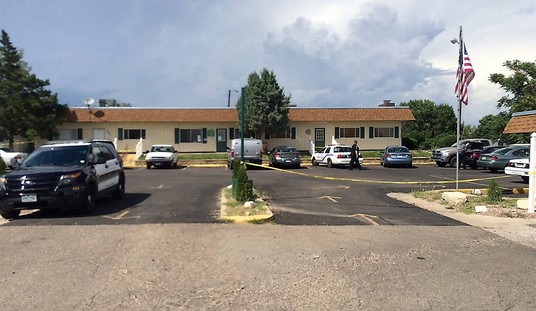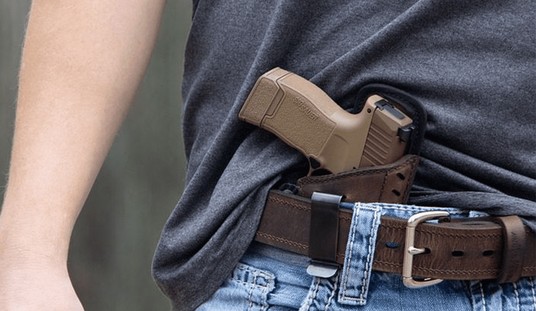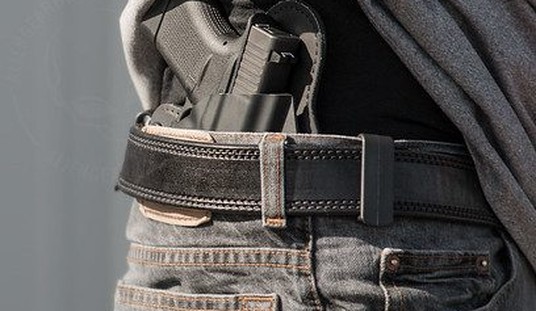At some point, every Second Amendment activist comes to the realization that the gun control debate isn’t really about violent crime or public safety, but instead is about gun ownership itself. A particular crime may serve as motivation for a change in gun laws, but the focus is generally on the inanimate object and not the individuals who would misuse it.
Red flag laws are a perfect example of this phenomenon; when a judge concludes that there’s reason to believe that a person poses a danger to himself or others and grants an Extreme Risk Protection Order, in the vast majority of states the person’s guns are taken from them but they themselves are left alone with their knives, pills, rope, belts, car keys, gasoline, and virtually every other object that could be used as a weapon or destructive device. It’s the person who’s deemed dangerous, but its the gun that’s seen as the only real danger to them (or their intended victims).
That’s basically the philosophy underpinning the gun control movement; get rid of the guns and the dangerous people won’t be dangerous anymore. Personally, I find that to be an argument of almost childlike simplicity, so I’m always amazed when smart people adopt the argument as their own. Stephen Grossman is the Dean Julius Isaacson Professor Emeritus at the University of Baltimore School of Law, and in the pages of the Baltimore Sun he’s wistfully pining for the halcyon days of his youth in the Bronx, when there were “far fewer guns and far fewer deaths,” presumably because gang members were knifing each other in between singing show tunes like “When You’re a Jet”.
I first encountered the gun lobby as a prosecutor in New York City arguing to the New York legislature that what were called “cop-killer bullets,” those designed to penetrate safety vests, should be outlawed. It seemed like a slam dunk to ban bullets not used by hunters or target shooters, or in self-defense or any other manner in which defenders of gun rights claim that guns are used responsibly. I naively believed that even the NRA would not oppose such a ban. I was wrong, and the NRA and many other gun groups have opposed virtually every proposal over the years, no matter how limited and reasonable, that restricts the use of guns or their ability to kill mass numbers of people.
Yes, before we had B.S. terms like “assault weapon” and “large capacity magazine” we had made up phrases like “Saturday Night Special” and “cop-killer bullets.” The gun control lobby has always been very good about demonizing the things they want to ban, and in this case Grossman would rather not talk about the reality of his attempt to ban ammunition defined as “armor piercing.” It’s true that the NRA was opposed to a ban that was introduced in Congress, but as the Washington Post reported way back in 1984, it was in large part because A) the legislation was so poorly written that it would have covered most center-fire rifle ammunition and B) the firearms industry had already voluntarily agreed to restrict sales of armor-piercing ammo to military and police (which could be fodder for a whole ‘nother column in itself).
Grossman goes on to complain that we shouldn’t let a little thing like the Bill of Rights stand in the way of “common sense gun reforms.”
Contrary to the arguments of some, the Second Amendment is not a bar to reasonable measures to limit the use of guns. This was made clear in two pro-guns rights cases decided by the court dealing with the constitutional right to bear arms. But we continue to be a country that is armed to the teeth and second only to Brazil in the number of gun deaths nationally — far eclipsing any nation in Europe.
Actually, Grossman’s wrong about that, at least on a per capita basis. There are a lot of countries with a higher murder rate than the United States, and the vast majority of them have incredibly restrictive gun control laws that don’t accomplish much in the real world. In fact, in 2017 the United Nations estimated the global homicide rate was 6.1 per 100,000. The U.S. homicide rate in 2017? 5.3 per 100,000 according to the FBI. Yep, our homicide rate was lower that the global murder rate, which doesn’t make any sense at all if, like Grossman, you believe that more guns equates to more crime.
The problem for Grossman is that we know that it’s a false premise. We have over 400-million privately owned firearms in the U.S. today, and our violent crime rate is roughly 40% lower than the highs of the early 1990s, when there were fewer guns around. In fact, before the riots of 2020 and the ensuing spike in violence in many cities, most of the states were sitting at or near 50-year lows in the homicide rate and overall rate of violent crime, which should be an impossibility if the “more guns, more crime” thesis had any real merit. Yet here’s Grossman…
Those of a certain age will remember when the gun lobby first argued that the surest way to avoid violence is to make sure more people possess guns, so the good folks can stop or deter the bad folks. How has that worked out over the years? We now see mass murders (terrorist and non-terrorist), road rage shootings, accidental shootings and all kinds of deaths that would not occur if there was no gun involved or if an incident led to violence, would not result in death.
Again, violent crime (before it surged last year) was at a 50-year low, despite all those guns around. How’s it worked out over the years? Well, I’d say a 50% reduction in the homicide rate between 1991 and 2019 is pretty darn good, actually. And just look at what’s happened to the homicide and violent crime rates in Florida since “shall issue” right to carry was adopted in 1987. More than 2-million people currently possess a valid carry license in the state, yet the murder rate has declined from 11.4 per 100K the year right-to-carry was adopted to 5.2 per 100K in 2019.
Grossman has also either forgotten or chosen to ignore the fact that Maryland has really restrictive gun control laws, and they’re not making Baltimore any safer. The state has a universal background check law, a ban on “assault weapons,” gun rationing, a “may issue” permitting system for concealed carry, a gun licensing law, and several other barriers to the full exercise of one’s Second Amendment rights, and yet Maryland’s murder rate was almost twice the national average in 2019 (9.0 per 100K statewide, compared to 4.0 per 100K nationally).
Once you fact check Grossman’s argument, there’s really not much left other than a wistful nostalgia for a “good old days” that really wasn’t that great as far as public safety goes. You’ve gotta go back to the 1950s and early 1960s to find a time when the violent crime and murder rates were lower than they were in 2019, and of course back then we didn’t have the Gun Control Act of 1968 or many other gun control laws in place, particularly in Democrat-controlled states like Maryland. The gun controls of the late 1960s and the 1970s didn’t curtail the crime rate, which only started to drop in 1991. That was a full three years before the Brady Bill and Joe Biden’s “assault weapons” ban were enacted by the Clinton administration, by the way, so activists like Grossman shouldn’t credit gun control for the decline.
Grossman concludes his piece with another emotional, not factual appeal:
Yes, the gun lobby has won most of its battles, but we still can close the loophole that allows sales of guns without any checks at gun shows and ban certain weapons of mass destruction that seem to proliferate these days.
Think of how many more kids we could keep from being killed if we could all just learn to live with that.
Think of how many more kids we could keep from being killed if we didn’t try to ban our way to safety and instead concentrated on positively impacting (either through intervention or incarceration) the small number of individuals who are responsible for a preponderance of shootings and homicides in cities like Baltimore. I don’t know how many lives Grossman believes could be saved with a law that can only be enforced retroactively (universal background checks) and a ban on firearms that are used in fewer homicides than fists and feet, but I can assure him that we can save many more with a strategy that doesn’t involve any new gun control laws at all.








